Ready to Translate using yourss365 internal Translate tool - 105 Languages Suppot »
Middle Eastern maze
On March 16, the Center for Middle East Policy at Brookings will host a discussion to launch a new book by Distinguished Fellow Itamar Rabinovich, entitled, “Middle Eastern Maze: Israel, the Arabs, and the Region 1948-2022″ (Brookings Institution Press, 2023). In this book Rabinovich, a senior academic historian who served as Israel’s ambassador to the United States and as a peace negotiator with Syria, has provided an expanded and updated version of his 2012 book “The Lingering Conflict.”
In this online event, the speakers will discuss the Arab-Israeli relationship in the larger context of Middle Eastern regional and international politics, examining new dynamics such as Iran and Turkey’s new roles in the region, the Abraham Accords, the full-fledged Syrian civil war, and the lengthy domestic political crisis in Israel.
Viewers can submit questions by emailing events@brookings.edu or by joining the conversation on Twitter with #MEMaze.

The Biden administration’s two-track Pakistan policy misses the mark
By Madiha Afzal
The U.S.-Pakistan relationship has weathered several bumps in the road over the past two years, including, most prominently, the fallout from the Afghanistan withdrawal and the Taliban takeover. The Biden administration has now settled on a bureaucratic division of labor in its policy toward Pakistan: a lack of engagement from the White House; robust, well-defined engagement from the State Department; and a continuation of long-standing military and defense ties. The new equilibrium is different from the past: President Joe Biden is the only U.S. president in recent memory not to have engaged with a Pakistani prime minister (neither Imran Khan nor his successor, Shehbaz Sharif). The bilateral relationship is also notably no longer centered solely around America’s interests in Afghanistan, as it was prior to August 2021: there is an effort by both sides to broaden its base.
Unfortunately, the overall relationship is weak at best. Here are the factors that have shaped the relationship over the last two years:
The Afghanistan factor
At the beginning of the Biden administration, Pakistan recognized the need to redefine the bilateral relationship, until then focused on Afghanistan, as the U.S. withdrawal from that country drew close. Prime Minister Imran Khan’s government pitched the need for a comprehensive relationship with the United States, one based on “geo-economics” — Pakistan’s catch-all for trade, investment, and connectivity — as opposed to a relationship focused on security concerns. The Biden administration wasn’t responsive, and the relationship got off to a cold start. At the time, the United States was focused on Afghanistan and the need for Pakistan to exercise pressure on the Taliban to push it toward an intra-Afghan peace. Then, as the Taliban undertook a systematic military takeover of Afghanistan while the United States withdrew, the relationship cooled further. In the months afterward, although Pakistan helped in evacuations from Kabul and in taking in Afghan refugees, the ignominy of the withdrawal — that the war ended with a clear Taliban victory and in view of Pakistan’s close relationship with the Taliban — pushed relations to a relative low point.
No phone call
Biden has not called a Pakistani prime minister in his more than two years in office. Biden neither mentioned Pakistan during the withdrawal from Afghanistan, nor showed any interest in engaging with the country at that point. The lack of a phone call drew considerable attention in Pakistan during Biden’s first year in office, and was ostensibly one of the reasons Khan declined the administration’s invitation to attend the first Summit for Democracy in December 2021. Even Pakistan’s catastrophic summer flooding in 2022, which elicited a robust U.S. government response, did not prompt a Biden call. Yet in October 2022, seemingly out of the blue, Biden mentioned Pakistan in strongly negative terms at a Democratic Congressional Campaign Committee reception, describing it as “what I think is maybe one of the most dangerous nations in the world: Pakistan. Nuclear weapons without any cohesion.” This statement did not go over well in Pakistan, prompting a bit of a walk back from the administration, though Biden may have really meant what he said.
Initially, the complete lack of White House engagement with Pakistan was somewhat of a puzzle. Now though, it seems it’s White House policy — reflecting the fact that Pakistan is not a priority. For Biden, it might draw from a desire to put Afghanistan behind him — and with it, its neighbor. Throughout Biden’s many years of watching the Afghanistan war from the Senate and then as vice president, Pakistan’s relationship with the Taliban had always been a source of tension.
Pakistani politics
In the spring of 2022, America was drawn into Pakistan’s domestic politics in a sudden, unfavorable manner: Khan blamed his ouster via a vote of no confidence on a U.S. “regime change” conspiracy, without evidence — a narrative that stuck among his supporters. In recent months, Khan has stepped back from the U.S. conspiracy narrative and has more directly blamed the Pakistani military for the fall of his government — the actual story. Still, the narrative complicated the U.S. relationship with Pakistan for months in 2022, as Khan’s supporters considered any engagement between the United States and the new government in Islamabad to be confirmation of the conspiracy.
Ties with State, and broadening the relationship
Although the White House remained silent, Secretary of State Antony Blinken and Khan’s foreign minister, Shah Mahmood Qureshi, spoke several times and met in New York in September 2021. Spring 2022 began a period of robust engagement from the State Department, a mini reset of sorts that has focused on expanding the relationship. In March 2022, the United States and Pakistan launched a year-long campaign marking 75 years of relations. In April, the new U.S. ambassador to Pakistan, Donald Blome, was sworn in. In May, Pakistan’s new foreign minister, Bilawal Bhutto Zardari, met Blinken in New York. The U.S. special representative for Commercial and Business Affairs, Dilawar Syed, visited Pakistan in July to “strengthen the economic partnership and bilateral trade” between both countries. Also in July, the two governments launched a health dialogue. Soon after Pakistan’s flooding disaster hit in August, U.S. Agency for International Development Administrator Samantha Power visited the country, documenting both the catastrophe as well as U.S. relief assistance; the United States has announced more than $200 million in flood assistance. Bhutto Zardari and Blinken met again in September when the 75th anniversary of U.S.-Pakistan relations was officially celebrated at the State Department. The relationship between the two counterparts appears constructive; it has focused on relief and recovery after Pakistan’s calamitous summer of flooding and increasing cooperation on economic matters.
Engagement and diplomacy continue apace on other fronts: State Department Counselor Derek Chollet and a delegation of senior U.S. government officials visited Pakistan in February 2023 in support of the U.S.-Pakistan relationship. The Pakistani commerce minister visited Washington the same month to hold a meeting under the U.S.-Pakistan Trade and Investment Framework — held after seven years — with United States Trade Representative Katherine Tai. Also in February, a U.S. congressional delegation led by Senate Majority Leader Chuck Schumer visited Pakistan to discuss the “broad-based partnership that includes trade, investment, regional security, and flood recovery efforts.” Pakistan has also been the single largest recipient of COVID vaccines from the United States since 2021.
Defense and military ties
The military leadership in Pakistan had a major transition last fall, with the chief of army staff, General Qamar Javed Bajwa, leaving his post after six years (following an extension). He visited Washington in October before his term ended and met Secretary of Defense Lloyd Austin. And the commander of United States Central Command, General Michael Kurilla, traveled to Pakistan to reaffirm security ties after the new chief of army staff, General Asim Munir, was sworn in.
The long-standing defense and security relationship continues (though it is no longer the entirety of the bilateral relationship). In September, the U.S. government notified Congress of a proposed $450 million foreign military sale to maintain Pakistan’s fleet of F-16 fighter jets. The security relationship also includes a key focus on counterterrorism and intelligence that presumably encompasses an over-the-horizon arrangement on Afghanistan — but that specific aspect remains shrouded in secrecy. CIA Director Bill Burns visited Pakistan twice in 2021: once in an unannounced visit in April and then again after the withdrawal in September.
What limits the relationship
Pakistan is in a very different place than when its government pitched a geo-economic reset in early 2021. It is now mired in a political and economic crisis, veering perilously close to default. For the time being, its spiraling economic situation and domestic problems limit its attractiveness as a U.S. partner.
Distrust born out of the last four decades of the U.S.-Pakistan-Afghanistan triangle will take time to overcome, despite both sides’ attempts in the last year at broadening the relationship. And while Afghanistan no longer defines the U.S. relationship with Pakistan, the Biden administration’s approach to its other neighbors, China and India, does restrict it. The administration’s intense competition with China, Pakistan’s long-standing ally; its growing partnership with India, Pakistan’s foe; and its focus on the Indo-Pacific (which excludes Pakistan) has led to a priority shift away from Pakistan. Pakistan has long said it doesn’t want its relationships with the United States and China to be seen as zero-sum, and the United States has acknowledged that it doesn’t see its relationships with India and Pakistan as zero-sum. Yet, the American approach to these two Pakistani neighbors does seem to, at this point, impose constraints on the bounds of the U.S.-Pakistan relationship.
This need not be the case: As I have long argued, Pakistan, the fifth-largest country in the world and a nuclear-armed nation, ought to be seen by the United States on its own terms and not through the prism of its neighbors. A cold shoulder risks pushing Pakistan further toward China — which is neither an inevitable nor desirable outcome for the United States. What’s more, Pakistan’s multiple crises — political instability, economic malaise, and rising insecurity — warrant greater American engagement, not less, and certainly more than the current administration’s policy of fractured engagement from the United States.
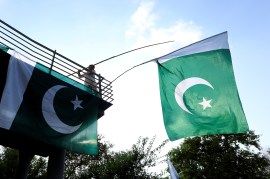
By Patricia M. Kim

Strategic partner of choice: Canada’s role in enhancing North American supply chain resiliency
By François-Philippe Champagne
Around the world, the COVID-19 pandemic has exposed weaknesses in global supply chains. Changes to consumer demands, labor shortages, and other structural factors have created a perfect storm of bottlenecks and back-orders. Families and businesses around the world are feeling the impact, as the cost of consumer goods—food, energy, and everything in between—is rising. Russia’s invasion of Ukraine, as well as other major geopolitical challenges, have since compounded this already difficult situation.
In this climate of uncertainty, jurisdictions around the world are looking for stability and predictability. They are turning to their most trusted allies, choosing to localize manufacturing capacity in locations with partners who are reliable, safe, and secure. As members of the world’s largest free-trade zone, Canada, the United States, and Mexico know that they have no better friends than each other. Since 1994, free trade agreements among our three countries have raised the fortunes of all North American businesses, workers, and families, as our economies have become more integrated and prosperous.
By working together to improve the reliability and fluidity of our supply chains, we have a chance to seize the moment and enhance the overall North American value proposition–and each partner has a role to play. Domestically, Canada is making strategic investments in key sectors to make essential supply chains more accessible and secure. Our Critical Minerals Strategy, for example, is securing the key inputs in batteries and semiconductors needed to support the world’s transition to the green digital economy of the future. In world markets driven by demand for microchips and batteries, Canada’s critical minerals, coupled with our reputation as a safe, reliable, and secure supplier of goods and services, make us the strategic partner of choice. That is why we have already secured investments from globally leading companies, including battery manufacturers, and continue to put into place a domestic battery ecosystem that will help meet the global demand for cleaner transportation alternatives.
When I was in Washington recently for a meeting with U.S. Secretary of Commerce Gina Raimondo, we discussed, among other things, our commitment to improve supply chain security in North America, including in the semiconductor industry. This includes work to strengthen domestic research and development, commercialize emerging technologies and innovations, and ramp-up manufacturing capacity in both countries to support our mutual goals for supply chain resilience and industry competitiveness. The Canada-U.S. Supply Chain Working Group, launched in 2021, is also central to our efforts to strengthen supply chain security and reinforce the deeply interconnected and mutually beneficial North American economic relationship.
I was also pleased to launch the Canada-Mexico High-Level Economic Dialogue in August. This was an opportunity to discuss ways that we can strengthen our North American competitive advantage through enhanced collaboration and cooperation. We also discussed the importance of supply chain resiliency as a means of fostering a more collaborative business environment and working with the private sector to enhance economic ties. Strengthening our competitive advantages as USMCA economies also requires us to grow our shared innovation ecosystems. In this regard, we also discussed ways to increase research collaboration to meet the complex challenges of our age.
As a friend, neighbour, and trusted partner, Canada is well positioned to help strengthen North America’s supply chain resiliency and industry competitiveness. What is more, we can take pride in knowing that our highly-integrated North American economy, founded and built upon the principles of transparency, diversification, security, and sustainability, allows us to offer an excellent value proposition in world markets. Canada will continue working with like-minded partners—especially our North American friends and neighbours—to help build a cleaner, greener, and more resilient global economy that is founded on the principles of free and open trade that has served us all so well.

The USMCA in 2023: Opportunities and challenges
By Claudia Ruiz Massieu
A trade agreement is much more than a text; it is a legal and institutional framework that lays the foundations for integration among the countries that sign it. It opens opportunities to prompt competitiveness, growth, and inclusive development, as well as boosts exchange dynamics beyond trade—in culture, education, and shared principles and values.
Nevertheless, without constant political dialogue, without the exchange of experiences, without a permanent updating effort, and without a tangible commitment in all the sectors that benefit from economic integration, a trade agreement runs the risk of becoming a “dead letter”: A simple list of rules to govern commercial transactions between its parties.
Nearly three years after its entry into force, the United States-Mexico- Canada Agreement (USMCA) has been instrumental in ensuring the competitiveness of the North American region’s economy in a complex and unprecedented global environment. This is no coincidence: It is the result of a joint effort among governments, the private sector, and civil society in our three countries.
During these years, the Special Committee for the USMCA Implementation in the Mexican Senate has worked in close coordination with government officials and stakeholders to take full advantage of the agreement for the benefit of Mexico and North America.
Now, it is precisely this unprecedented context that calls us to expand and deepen our integration, consolidating and creating new value chains through strategies such as nearshoring.
Global events and crises such as the COVID-19 pandemic, Russian invasion of Ukraine, trade dispute between the U. S. and China, and their effects on the global economy—while dire—have presented an opportunity that we must take advantage of.
Mexico, for instance, is a great destination for nearshoring. We have a strategic location, huge communications infrastructure network, and multiple border crossings with the U.S. that service cargo vehicles (15 according to NADBank): All factors that would make international transportation logistics more efficient in a context that demands prompt and effective solutions.
In this context, 2023 is a year full of opportunities in the USMCA implementation, in terms of opening of new markets, creation of new value chains, and innovation in strategic sectors for the future.
Recently, in the North American Leaders’ Summit, our three countries agreed to deepen economic cooperation, promote investment, and reinforce competitiveness, innovation, and resilience by:
- Organizing the first trilateral semiconductor forum with industry to adapt government policies and increasing investment in semiconductor supply chains across North America in early 2023.
- Coordinating semiconductor supply chain mapping efforts to develop a collective understanding of unmet needs.
- Expanding North American critical minerals resource mapping to collect details on resources and reserves. The Geological Surveys of each country will organize a trilateral workshop to share data and facilitate cooperation.
- Partnering with the region’s private sector to increase student development and mobility under a new North America Student Mobility Project.
- Convening industry and academia experts in semiconductors, ICT, biomanufacturing, and other key advanced manufacturing and logistics industries for design sessions on the skills needed to develop the workforce of North America over the next five years.
These announcements are great news for all of us involved in the USMCA implementation and for our countries, as they represent the possibility of consolidating a highly competitive sector, crucial for technological development in the coming decades.
Another piece of good news is the recent resolution of the panel on the differences in interpretation of the regional content rules for the automotive industry, which ruled in favor of Mexico and Canada, granting certainty to one of the most integrated sectors in our region.
But it must be said that it’s not all peaches and cream. There are some reasons for concern. Among the issues that require our special attention, the presidential decree banning transgenic corn in Mexico as of 2025 stands out; as well as the controversies over the legislation that privileges state-owned companies over their private competitors in the energy sector, which directly affected investors from our main trading partners.
On the other hand, the transition period of NAFTA’s investment protection and arbitration regime for legacy investments ends on July 1st. According to NAFTA (Article 1119), a notice of intent must be submitted at least 90 days before a claim is filed. So, the deadline to file a notice of intent and trigger the start of a NAFTA legacy investment dispute is April 1st, 2023 at the latest. Investors should be prepared for this new phase.
Finally, nothing is set in stone. As before, in 2023, seizing the opportunities and facing the challenges depends on us. From the Mexican Senate—in the Special Committee for the USMCA Implementation—we will continue working with the government, the private sector, and civil society to write new success stories in the book of our regional integration.

USMCA positions North America for global competitiveness
By Jay Timmons
Manufacturers of all sizes, from small, family-owned and -operated businesses, to multinational enterprises, are counting on the United States–Mexico–Canada Agreement (USMCA) to strengthen their supply chains and help them grow. The USMCA can be a model for how the U.S., Mexico, and Canada can capitalize on our close regional ties, but it will require all three governments to live up to and uphold the spirit of the agreement. The rewards are worth it—if the USMCA works as intended, it can help address bigger geopolitical challenges and strengthen our supply chain resiliency.
This summer will mark the third year since the USMCA was ratified. Free trade between our markets has been advantageous for manufacturers across the U.S. and North America for decades, and the USMCA helps to secure those advantages. The USMCA updated the standards for the 21st century digital economy and top-class intellectual property rules—which are absolutely essential for innovation. It ensured duty-free exports across our markets and broadened manufacturers’ access within the three North American countries in markets for products such as food and remanufactured goods.
Under these conditions, more than $2 billion worth of manufactured goods cross the U.S., Mexican, and Canadian borders each day. More than two million U.S. manufacturing jobs depend on the exports our industry sends to Mexico and Canada. Our business partners in these countries purchase one-fifth of the value of U.S. manufacturing output.
But the U.S. can and should do more to ensure that our partners live up to the spirit and letter of the USMCA. Major free trade agreements are only as good as their enforcement, and while the USMCA has valuable enforcement mechanisms, it is vital that we utilize these enforcement tools. For example, Mexico has taken up measures that create new regulatory hurdles and other commercial challenges that negatively impact market access for manufacturers in the U.S. Mexico’s energy generation and power policies are often preferential toward Mexican businesses, making it more difficult for manufacturers in the U.S. to do business in the market. These manufacturers have also faced holdups in the issuance of operating and customs permits for energy projects, limits on advertising and IP, and bans and new customs barriers that especially harm small businesses.
Other challenges impacting manufacturers in Mexico include expanded food-labeling requirements that threaten U.S. exports, the failure of Mexico’s regulators to promote competition in the telecom market, measures that would require excessively burdensome electronic waybills, a ban on imports of crop-protection products and biotechnology-derived agricultural products, and efforts to introduce new, problematic technical regulations and compliance requirements.
The Canadian government has also taken actions that undermine the spirit of the agreement. There is a Canadian government proposal to brand “plastic manufactured items” as “toxic substances” under the Canadian Environmental Protection Act, with direct implications for U.S. exports in a wide range of manufacturing sectors. And although Canada committed to opening its market for dairy producers under the USMCA, it has skirted these obligations through the manipulation of import license procedures and tariff-rate quota allocations that undermine access to the Canadian market.
Addressing these disruptive actions is essential to securing the long-term success of the agreement.
Our governments can also boost the effectiveness of the USMCA by strengthening the underlying fundamentals of our economies— especially our workforce. Manufacturers in the U.S. are facing a significant skills gap and will need to fill more than four million jobs by 2030, according to research by Deloitte and the Manufacturing Institute—the workforce development and education partner of my association, the National Association of Manufacturers. That means we should invest in training the skilled workforce we need. Our countries should also invest more in domestic production of key inputs, as the U.S. did with the CHIPS and Science Act last year to heavily boost U.S. production of semiconductors, providing a boon for the entire North American economy. And our countries should continue making historic investments in our critical infrastructure—which helps us move our goods and inputs across our markets—as the U.S. did with the Infrastructure Investment and Jobs Act in 2021.
These kinds of policies will position us well for continued global leadership and for economic competition with China. The connection between the USMCA countries should make it easier for us to coordinate our use of domestic and multilateral trade enforcement tools to target and counter problematic Chinese trade behaviors. As we continue to grow our own manufacturing capacity, we can build more resilient North American supply chains and source vital inputs to each other without depending on China for essentials, such as critical minerals. The U.S., for example, has more critical mineral reserves than any other country, and this should help bolster our supply chains across the continent without being subject to supply shocks in Asia.
The USMCA is an essential part of the foundation not only for the next manufacturing decade in North America, but also for our countries to strengthen our global competitiveness and economic influence. If our partners address these concerns—and they certainly can do so swiftly—then we will have even more to celebrate when that third anniversary rolls around.

Ajay Banga: The US nominee for World Bank president
By Homi Kharas
The nomination of Ajay Banga as the U.S. candidate for World Bank president is welcome news. If history is any guide, Mr. Banga will be elected, maybe unanimously, as the next World Bank president. His nomination, therefore, carries considerable import. It suggests that the Biden administration seriously believes the World Bank should:
- Scale up financial support to all clients—low-income countries (LICs), lower-middle-income countries (LMICs), upper-middle-income countries (UMICs), vulnerable countries, and countries facing fragility and conflict.
- Develop a new growth vision, narrative, and operational package that can simultaneously deliver on internationally agreed climate and development goals.
- Support national governments in developing cooperative multilateral partnerships with other official financing institutions and private investors to deliver systemic change.
Finance
One of the most urgent tasks facing the new president is to navigate complex financial waters. The founding World Bank agency—the International Bank for Reconstruction and Development (IBRD)—has successfully used leverage to finance its operations. Since 1946, shareholders have contributed $20.5 billion in paid-in capital, which has supported a total of more than $500 billion in loans for poverty reduction.
Today, leveraged institutions are the most obvious channels through which to finance climate and development at a scale that could make a material difference—now thought to be on the order of $1 trillion a year. IBRD is faced with difficult choices. Its shareholders have encouraged it to scale up lending significantly, but opinion is divided as to how much can be done based on existing capital, and how much new capital will be required. Ajay Banga will need all his experience as CEO of Mastercard, a large financial services firm, to find the right balance; partly a technical challenge and partly a political challenge of persuading IBRD’s national government shareholders that he is able to deliver more to all clients—LICs, LMICs, and UMICs—without jeopardizing the financial health of the institution and without shortchanging any one group by paying more attention to the other.
The politics come into even sharper focus when negotiating with governments on contributions to the International Development Association, the concessional lending arm of the World Bank, and other World Bank-managed trust funds, including the Climate Investment Funds. Donors have been moving away from the World Bank. For example, countries contributed $36 billion equivalent to IDA16 for FY 2012-14, but only $23.5 billion to IDA20 for FY 2023-25. The co-benefits to rich countries of faster and more sustainable development in developing countries are clear—less conflict and fragility, more trade, biodiversity protection, participation in pandemic surveillance, and of course, climate mitigation and disaster risk reduction. Mr. Banga’s job will partly be to encourage donors to provide more aid, and partly to make the case that existing aid can be more effectively used when channeled through multilateral funds, such as those provided by the World Bank.
An added complication: Aid is now needed for many middle-income countries—those suffering loss and damage from climate-related natural disasters, those being encouraged to act in the global interest (for example, coal decommissioning, pandemic surveillance, and nature preservation and conservation), and those where a small amount of grants can catalyze action, like funds needed for project preparation and for legal and financial technical advice on specialized topics and for staffing new platforms. Building the case for aid to middle-income countries without crowding out aid to the poorest and most vulnerable countries is delicate but necessary.
Market borrowing and aid will not be sufficient to get the job done. The World Bank must mobilize private capital. It has a range of instruments, from guarantees to insurance products, but these are not used at scale. A president who understands private business could help unleash new programs of “blended finance,” a much-discussed concept that has so far failed to deliver on its potential.
Vision and operations
In 2014, under Ajay Banga’s leadership as CEO, Mastercard launched a nonprofit Center for Inclusive Growth with a mission to “advance equitable and sustainable economic growth and financial inclusion around the world.” The core ideas of equity and sustainability resonate with the discussion today about a new development narrative—the “global growth story of the 21st century” as Professor Nick Stern and colleagues have called it. It bodes well for the World Bank that its new president championed these ideas before they became fashionable and is committed to climate, equity, and development. He will now have an opportunity to go from theory to practice.
Any large, spread-out organization needs a vision and mission statement that answers the what, how, and why questions of employees, clients, and other stakeholders. The World Bank, with 19,000 staff from 170 nations and offices in 130 locations, certainly qualifies as a large, spread-out organization. Mr. Banga is used to such structures—Mastercard has upward of 80 offices worldwide and a staff of 29,900. Many modern business practices of large organizations, such as scaling solutions, data-driven learning, and the use of innovative technologies should be second nature to him. He will also be well-versed in the art of persuading finance ministers and other government officials in developing countries to open sensitive sectors to the private sector, a skill he will need if the vested interests in state-owned utilities and other government monopolies are to be overcome.
Multilateral partnerships
Perhaps the biggest challenge for the new president will be to strengthen true partnerships with other financial institutions, domestic and international, bilateral and multilateral, and official and private. Long-standing calls for the multilaterals to improve efficiency and effectiveness by operating as a system have largely gone unheeded. Each retains its own procurement and safeguard rules, and there is little co-financing of larger programs that could achieve systemic change. Each guards its own independence and culture. Even within the World Bank Group, it has been hard to find areas of true synergy between the various organizations.
These issues are coming to the fore in the new partnerships being created to manage green transitions. National governments may be allowed to draw up their own plans, but bilateral donors are vocal advocates in the implementation, sometimes bringing their own geopolitical issues into the mix. Meanwhile, the private sector is often called on last, more as an observer than a partner—witness the deadlock over their participation in debt crisis resolution mechanisms.
Building effective partnerships is a culture issue that can be particularly hard for organizations that think of themselves as best-in-class. Ceding ownership means losing control and exposing an institution to risks that derive from the actions of its partners. Those can distract and cause reputational damage, but they must be managed rather than avoided through taking charge.
There are many other positives in Mr. Banga’s resume that suggest he has the qualifications to be an outstanding president. Let us hope that his nomination is but the first step in a more systematic effort by its largest shareholder to make the World Bank fit-for-purpose in the 21st century.
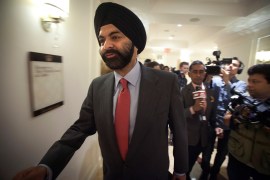
National park in Senegal shows off three surprise new recruits in fight to save critically endangered species from extinction
A lioness in one of the world’s rarest lion populations has given birth to three cubs, new video footage shows, raising hopes that the critically endangered big cat can be saved from extinction.
In contrast to their southern cousins, west African lions have almost completely disappeared. Scientists believe between 120 and 374 remain in the wild, their historic range reduced to four populations clinging on in Nigeria, Benin, Niger and Burkina Faso.
Continue reading...
Supreme court rules for freedom of association but landmark decision sparks backlash from government and churches
The supreme court of Kenya has criticised the government for failure to register an association for LGBTQ+ people, saying the decision discriminates against the rights of the community.
Although same-sex unions remain illegal in Kenya, the court ruled that everyone has a right of association. It is the culmination of a decade-long legal battle, and a victory for the LGBTQ+ community.
Continue reading...
Third-party candidate Peter Obi to challenge Nigeria election result
Political outsider says says he will prove he won, after official result awarded victory to ruling party’s Bola Tinubu
The third-party candidate Peter Obi said he would challenge the outcome of Nigeria’s fiercely fought presidential elections after official results awarded victory to the ruling party’s candidate, Bola Tinubu.
“We will explore all legal and peaceful options to reclaim our mandate. We won the election and we will prove it to Nigerians,” Obi, the Labour party candidate, told reporters on Thursday in the capital, Abuja.
Continue reading...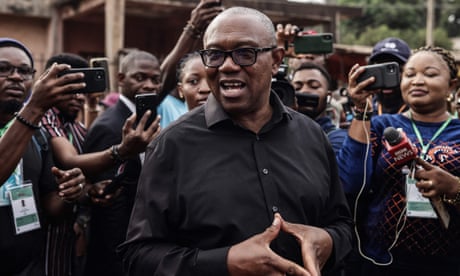
How family and Libya conflict radicalised Manchester Arena bomber
Parents’ extremist views and civil war in the country of their birth set Salman Abedi on path to terrorism
Although Salman Abedi was born in Manchester, on New Year’s Eve in 1994, his path to becoming one of the UK’s most deadly terrorists began in Libya, the country of his parents’ birth.
It was from there that Ramadan Abedi and Samia Tabbal fled in 1993, claiming asylum in the UK on the basis that they faced persecution under the regime of Muammar Gaddafi. The couple went on to establish new lives in Fallowfield, south Manchester, with their children attending local schools.
Continue reading...
Scientists prove clear link between deforestation and local drop in rainfall
Study adds to fears Amazon is approaching tipping point after which it will not be able to generate its own rainfall
For the first time researchers have proven a clear correlation between deforestation and regional precipitation. Scientists hope it may encourage agricultural companies and governments in the Amazon and Congo basin regions and south-east Asia to invest more in protecting trees and other vegetation.
The study found that the more rainforests are cleared in tropical countries, the less local farmers will be able to depend on rain for their crops and pastures.
Continue reading...
Uganda MPs revive hardline anti-LGBTQ bill, calling homosexuality a ‘cancer’
In a country where gay sex is already punishable by life in prison, campaigners have condemned proposed new law as ‘demonisation’
MPs in Uganda have reintroduced a controversial anti-LGBTQ bill, with one describing homosexuality as a “cancer”, attracting strong condemnation from rights campaigners.
Asuman Basalirwa, an opposition MP, made the remark as he tabled the draft law [pdf] which seeks to punish gay sex and “the promotion or recognition of such relations”.
Continue reading...
‘A part of winter is missing’: Ottawa grieves over lack of canal ice for skating
Rideau has not turned into world’s long ice rink as usual, laying bare unpredictable realities of climate crisis
Every winter for more than two decades, Chris Macknie has laced up boots, clipped on skis or slipped on running shoes to compete in Ottawa’s Winterlude triathlon.
The event, held in dead of winter, has hundreds skate along the frozen Rideau canal, swapping out their blades for nordic skis and then finish with a run.
Continue reading...
Man lost in Amazon for a month says he ate worms and drank own urine to survive
Bolivian man says it helped that he knew survival techniques after becoming separated from friends on hunting trip in January
A Bolivian man who claimed to have been missing in the Amazon alone for a month has recounted eating insects and worms, collecting water in his boots and drinking his own urine to stay alive.
If confirmed, this could make Jhonatan Acosta, 30, one of the longest-ever lone Amazon survivors.
Continue reading...
New Easter Island moai statue discovered in volcano crater
The 1.6-metre statue has been described as ‘full-bodied with recognisable features but no clear definition’
A new moai – one of Easter Island’s iconic monolithic statues – has been found in the bed of a dry lake in a volcano crater, the Indigenous community that administers the site on the Chilean island has said.
The statue was found on 21 February by a team of scientific volunteers from three Chilean universities who were collaborating on a project to restore the marshland in the crater inside the Rano Raraku volcano.
Continue reading...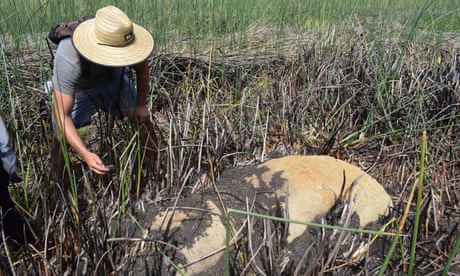
‘Havana syndrome’ not caused by foreign adversary, US intelligence says
The involvement of overseas foes in ‘anomalous health incidents’ suffered by US diplomats and spies was deemed ‘very unlikely’
The mysterious set of symptoms known as “Havana syndrome” was not caused by an energy weapon or foreign adversary, US intelligence has concluded.
The assessment concludes a multi-year investigation into approximately 1,000 “anomalous health incidents” (AHIs) among US diplomats, spies and other employees in US embassies and missions around the world.
Continue reading...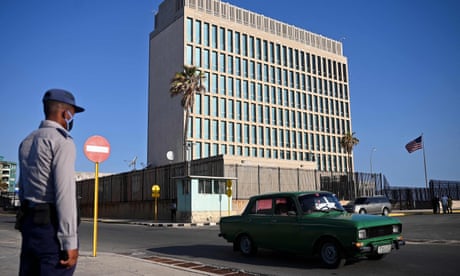
Canadian government urged to test sick patients for herbicide
Patients in New Brunswick with array of symptoms ‘show signs of exposure to glyphosate’, says neurologist
A neurologist who believes his patients are suffering from a suspicious illness has pleaded with the Canadian government to carry out environmental testing he thinks will show the involvement of the herbicide glyphosate.
For more than two years, dozens of people in the Canadian province of New Brunswick have experienced a distressing array of neurological symptoms, initially prompting speculation that they had developed an unknown degenerative illness – and that figure is believed to be far higher than official reports.
Continue reading...
Canada bans TikTok on government devices over security risks
EU and parts of US already block access to Chinese-owned app amid concerns over data privacy and security
Canada has joined the US and EU in enacting a sweeping ban preventing TikTok from being installed on all government-issued mobile devices, as western officials take action over the Chinese-owned video-sharing app.
Justin Trudeau, the Canadian prime minister, did not rule out further action. “I suspect that as government takes the significant step of telling all federal employees that they can no longer use TikTok on their work phones, many Canadians from business to private individuals will reflect on the security of their own data and perhaps make choices,” he said.
Continue reading...
China says military budget to increase again by ‘appropriate’ level
Spokesperson does not specify figure but announces rise is needed to meet complex security challenges
China’s military budget is set to increase again, the spokesperson for its rubber-stamping parliament has said, before a week-long political meeting expected to make big changes to China’s system of governance and increase measures to combat international sanctions.
The spokesperson for the National People’s Congress, China’s legislative body, addressed the media on the eve of its annual meeting to outline the week’s agenda, including changes to the constitution and the legal sector, and endorsing new appointments to senior roles.
Continue reading...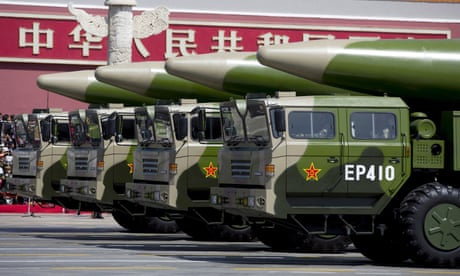
Two children among 17 people killed after fire at Jakarta fuel storage depot
Another 60 people injured and hundreds evacuated after fire at Pertamina’s Plumpang depot
At least 17 people including two children have died after a fuel storage depot fire in Jakarta.
Three people are still missing after Friday night’s blaze at state energy firm Pertamina’s Plumpang depot in north Jakarta, with Indonesian officials the next day calling for an audit of “all fuel facilities and infrastructures” in the country.
Continue reading...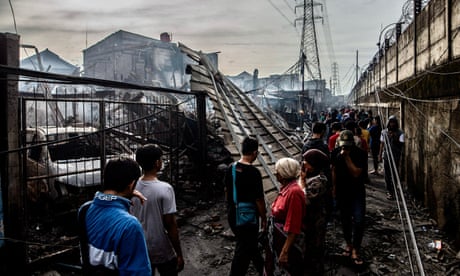
Hong Kong Tiananmen vigil organisers convicted under national security law
Three Hong Kong Alliance members, including prominent pro-democracy activist Chow Hang-tung, face up to six months in jail
Three former members of a Hong Kong group that organised annual vigils to mark China’s Tiananmen Square crackdown have been found guilty of not complying with a national security police request for information.
Chow Hang-tung, 38, a prominent Hong Kong pro-democracy activist and former vice-chairperson of the Hong Kong Alliance in Support of Patriotic Democratic Movements in China, was among those convicted by the magistrate court.
Continue reading...
State of emergency declared in Vanuatu after second cyclone in a week
Cyclone Kevin passed over the capital Port Vila less than three days after Cyclone Judy cut power in the city
A state of emergency was declared in Vanuatu as category 4 Cyclone Kevin brought gale-force winds and torrential rain to the Pacific nation battling its second major cyclone in a week.
Cyclone Kevin passed over the capital Port Vila late on Friday and was moving across the southern island province of Tafea on Saturday morning, bringing wind gusts in excess of 230km/h, according to the country’s meteorology department.
Continue reading...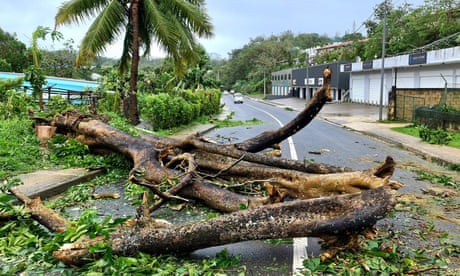
Growers count cost as Cyclone Gabrielle buries New Zealand vineyards in silt
Deadly storm left wine regions of Hawkes Bay and Gisborne covered in mud just before harvest time
Wine-growing regions in New Zealand’s North Island have been devastated by Cyclone Gabrielle, with some vineyards there facing a long path to recovery after being buried by torrents of silt just before harvest time.
Wine drinkers could face a long wait for their favourite bottle from Hawke’s Bay and Gisborne after last month’s storm, which killed at least 11 people, and left grower Philip Barber sheltering on the roof of his house with his wife and two small children.
Continue reading...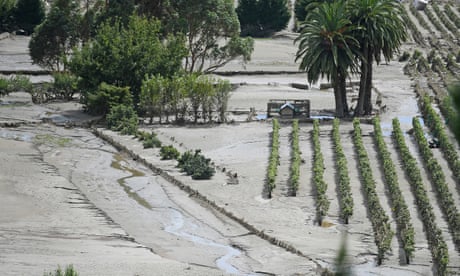
FBI grilled Leonardo DiCaprio over ties to Malaysian fugitive financier – report
Files show actor had relationship with Jho Low, on the run over links to 1MDB scandal, and Kim Kardashian was also interviewed
New details have emerged of the actor Leonardo DiCaprio’s ties to Jho Low, the Malaysian financier turned fugitive currently wanted by international authorities over his links to one of the world’s largest corruption scandals.
On Thursday, Bloomberg revealed previously undisclosed details from FBI documents in which authorities interviewed DiCaprio in 2018 about his relationship with Low, who is accused of involvement in a money-laundering scheme of over $4.5bn being siphoned from the Malaysian state investment fund, also known as 1MDB.
Continue reading...
Daniel Duggan says he faces ‘gross injustice’ if extradited to US in speech from Sydney prison
The former US marine pilot urges his audience to ‘say no to politically charged extraditions of Australian citizens’
In a speech from prison, the Australian pilot Daniel Duggan has said he faces a “gross injustice” if extradited to the US and, potentially, a “cruelly long sentence”, warning Australia against acquiescing to the demands of powerful countries.
The address, dictated by Duggan from his prison cell to his legal team, and read on his behalf on Saturday night in Sydney, urged his audience to “say no to Australia being a political lackey to any foreign government, as allies can be dangerous too”.
Sign up for Guardian Australia’s free morning and afternoon email newsletters for your daily news roundup
Continue reading...
UK, US or a hybrid? Intense speculation as Australia’s $170bn nuclear submarine choice looms
UK and Australian ministers have been hinting at a trilateral design for the eight boats, but all options are still on the table in Australia’s biggest defence purchase
Australia is set to within a couple of weeks learn some basic details about a program that could cost more than $170bn and will run for decades.
The opposition leader, Peter Dutton, this week warned against opting for a new UK design. For now though, the Aukus submarine program is a “black box”, says Tom Corben, a foreign policy and defence research fellow at the University of Sydney’s United States Studies Centre.
Sign up for Guardian Australia’s free morning and afternoon email newsletters for your daily news roundup
Continue reading...
Christian prayer march along Newtown street was ‘unauthorised protest activity’, police say
Around 30 men filmed marching down the LGBTQ+ hub of King Street praying and holding rosary beads above their heads
A group of around 30 men staged a Christian protest march on a popular entertainment strip in Sydney’s inner west on Friday night, in what police confirmed was “unauthorised protest activity”.
The men were filmed marching down King Street in Newtown, while praying and holding rosary beads above their heads.
Sign up for Guardian Australia’s free morning and afternoon email newsletters for your daily news roundup
Continue reading...
Police foil plan to bring $1bn worth of cocaine into Western Australia
Officers duped the alleged criminals into believing they had gotten away with the import, police say
A covert police operation has foiled a billion dollars worth of cocaine entering Western Australia, with officers duping the alleged criminals into believing they had gotten away with the import.
Operation Beech kicked off in November after Drug Enforcement Administration agents seized a record 2.4 tonnes of cocaine allegedly bound for Australia off the South American coast.
Sign up for Guardian Australia’s free morning and afternoon email newsletters for your daily news roundup
Continue reading...
PM says Labor has ‘balance right’ on super tax concessions – as it happened
This blog is now closed
Adam Bandt says Greens could support key Labor climate policy if fossil fuels developments paused
The Greens say they could support the Albanese government’s changes to the safeguard mechanism – a key climate policy – if it agreed to pause new fossil fuel developments until the parliament has dealt with planned changes to national environment laws.
Under Labor - no more privatisation. We’ll build the tunnel but we won’t sell it.
Any revenue from tolls goes straight back into public hands to build for the future.
Continue reading...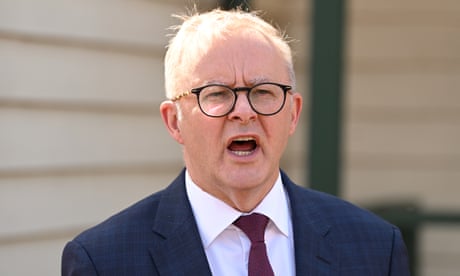
Tanya Plibersek urges assault survivors to reach out for help after her daughter reveals own story
In an extract of a new book, Plibersek says her daughter’s experience was part of the reason she didn’t seek the Labor leadership in 2019
- Follow our Australia news live blog for the latest updates
- Get our morning and afternoon news emails, free app or daily news podcast
Tanya Plibersek has urged survivors of assault to reach out for help after her daughter revealed her own story of sexual and domestic violence.
In an extract from Margaret Simons’ book Tanya Plibersek: On Her Own Terms, published in the Good Weekend magazine on Saturday, the former Labor deputy leader revealed part of the reason she did not run for leader of the party in 2019 was because her daughter was involved in legal action related to the abuse at the time, and would be appearing as a witness in court.
Sign up for Guardian Australia’s free morning and afternoon email newsletters for your daily news roundup
Continue reading...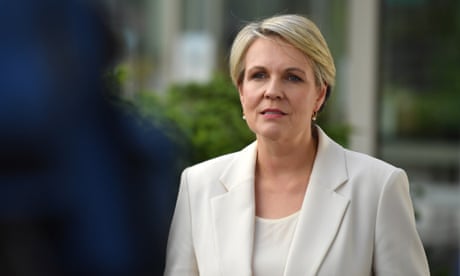
As it happened: street fighting in Bakhmut as battle rages for control of the city
UK intelligence says Ukraine attempting to reinforce contested city with elite units but resupply lines increasingly limited
More from BBC Radio 4’s Today.
General Sir Richard Shirreff, Nato’s former deputy supreme allied commander Europe, told the programme that some countries view the conflict in Ukraine as a “European war”.
There are many countries, particularly Sub-Saharan Africa and other parts of the world where the battle of the narrative has not been won, and that’s something that I think the West absolutely need to focus on.
I think there needs to be a recognition that many of the impacts of the war are hitting particularly African countries and other parts of the world very hard and that support needs to be given… and avoid the perception this is very much seen as a European war.”
The Ukrainians have arguably achieved a strategic success thusfar in forcing the Russians to expend vast amounts of manpower and equipment in what is likely to be, if they take it, a Pyrrhic victory…”
What we’ve seen from the West and Nato countries is a sort of incremental supply … it’s dribbled in rather that coming in in a concentrated way. If they’d had the stuff that they need months ago, we probably wouldn’t be where we are now. So this places a real imperative on speeding up the supply, the integration, the logistics support, the training and all the other stuff that needs to be done to give the Ukrainians the tools they need to do the job.”
There is fighting in the city and there are also street fights but thanks to the Ukrainian armed forces they still haven’t taken control over the city.
Their only goal is killing people and the genocide of the Ukrainian people…the tactic that the Russians are using is the tactic of parched land.
They want to destroy Bakhmut, they want to destroy the city…and I honestly can’t understand why they’re doing this.”
Continue reading...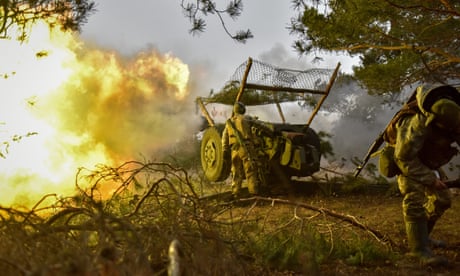
Greek train crash: court date for stationmaster delayed amid angry protests
Man who admits responsibility for disaster that killed at least 57 people is now due in court on Sunday
A court appearance for the stationmaster involved in Greece’s worst-ever train disaster has been postponed as the country braces for more mass protests over the crash that killed at least 57 people.
Thousands of people have protested across the country since Tuesday’s collision between a passenger train and a freight train, with public anger mounting over government failure to manage the rail network.
Continue reading...Race to get last children out of Bakhmut as city becomes ‘hell on earth’
With Russian forces closing in, police try to persuade remaining citizens to get out and access routes come under fire
• Russia–Ukraine war: latest updates
War breeds euphemism and metaphor. In the battle for the Donbas city of Bakhmut, threatened with a closing encirclement by Russian forces after seven months of bitter fighting, there are “White Angels” and “Dark Angels”, the “road of life” (the Bakhmut-Lysychansk highway, which is anything but) and the “Invincibility Centre”.
The White Angels, a police evacuation group, scour the lethal districts of the shell-ruined city to evacuate children and the elderly.
Continue reading...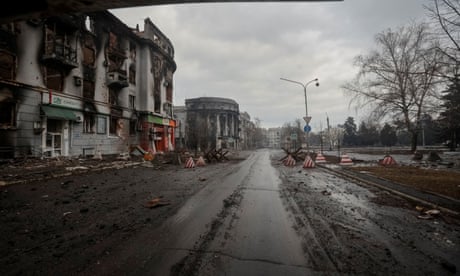
Ukrainians defending Bakhmut under severe pressure from Russian onslaught
Regular army and Wagner units advancing into northern suburbs of north-east Donetsk city, MoD reports
Ukrainian forces defending Bakhmut are facing increasingly strong pressure from Russian forces, according to British military intelligence, with intense fighting taking place in and around the eastern city.
Ukraine is reinforcing the area with elite units, while the regular Russian army and forces of the Russian private military Wagner group have made further advances into Bakhmut’s northern suburbs, the UK Ministry of Defence said in its daily intelligence bulletin on Twitter.
Continue reading...
‘Gruyere’ can be used to describe US cheeses, court rules
Decision means word cannot be restricted in US only for kind made originally in France or Switzerland
A US appeals court has ruled that the word “gruyere” is a common label for cheese and cannot be reserved just for the kind made originally in France or Switzerland.
The US does not have the same strict rules as Europe on the designation of origin for foods, said judges in the Richmond, Virginia-based US court of appeals for the fourth circuit.
Continue reading...
Russia-Ukraine war at a glance: what we know on day 374 of the invasion
Situation in besieged city of Bakhmut appears dire as Joe Biden and Olaf Scholz meet to coordinate support for Ukraine
Continue reading...
Dozens more Iranian schoolgirls taken to hospital after suspected poisonings
Students from across five provinces receive treatment as president asks ministers to investigate latest cases
Dozens of Iranian schoolgirls across five provinces have been admitted to hospital in a new wave of suspected poisoning attacks, according to local media.
Hundreds of cases of respiratory distress have been reported over the past three months among schoolgirls mainly in the city of Qom, south of Tehran, with some needing hospital treatment.
Continue reading...
IAEA chief holds ‘constructive’ talks in Iran after uranium enrichment findings
Rafael Grossi to meet president to ‘relaunch dialogue’ on nuclear programme, says source, following discovery of 83.7% enrichment
The UN nuclear watchdog chief has said he has had “constructive” meetings with Iranian officials in Tehran after the discovery of uranium particles enriched to near weapons-grade level.
The two-day visit by the head of the International Atomic Energy Agency (IAEA), Rafael Grossi, comes as the Vienna-based organisation seeks greater cooperation with Iran over its nuclear activities.
Continue reading...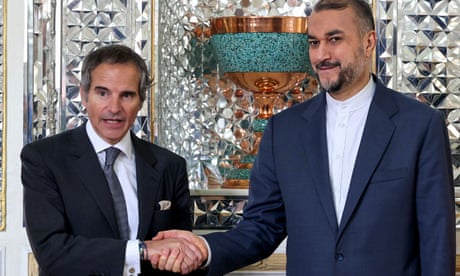
British health worker shot multiple times in Iran protests, injuries show
Exclusive: British-Iranian man says he was attacked after protesting against an assault on a teenage girl by security services
This story contains graphic images
A British-Iranian health worker who joined anti-regime street protests in Tehran still has five shotgun pellets lodged in his body after being fired at repeatedly by Iranian security forces at point-blank range.
It is thought the security officers were using shotguns to fire buckshot cartridges containing multiple pellets that then spread through the victim’s body.
Continue reading...Dozens of schoolgirls in Iran taken to hospital after poisoning
Suspected attack on students in city east of Tehran is latest in spate of incidents over past three months
Dozens of schoolgirls in Iran were admitted to hospital on Tuesday after a mysterious poisoning, an Iranian news agency has reported, in the latest in a spate of suspected attacks.
Hundreds of cases of respiratory distress have been reported in the past three months among Iranian schoolgirls, mainly in the city of Qom, south of Tehran, with some needing hospital treatment.
Continue reading...Christian Aid claims it was subject to act of ‘lawfare’ by pro-Israel group
The charity was taken to court for its work in the Middle East by the US body, whose director justifies litigation against NGOs that ‘cross the line’
A leading NGO has broken its silence on a bruising legal battle with a pro-Israeli advocacy group, describing it as an act of “lawfare” aimed at inflicting financial and reputational damage on organisations that do charitable work with Palestinians.
Christian Aid, the UK-based charity, was forced to spend about £700,000 defending itself against accusations that it had provided “material support” to terrorists, chief executive Patrick Watt has said.
Continue reading...Israeli police arrest five over settler rampage in West Bank
Officers says they expect to make more arrests over violence described by Israeli general as ‘pogrom’
Israeli police have arrested five suspects over a Jewish settler rampage in the occupied West Bank earlier this week that an Israeli general described as a “pogrom” and which followed a deadly Palestinian gun attack.
Shops in the Palestinian village of Huwara remained closed on army orders on Wednesday amid a heavy Israeli military presence, residents said. A Palestinian gunman killed two Israeli brothers there on Sunday, prompting assaults by settlers on houses and cars during which one Palestinian was killed.
Continue reading...Anger grows over Afghan journalists still stranded by Home Office inaction
Press members living under the Taliban, and living uncertain lives in Pakistan, must be given clarity say campaign groups
Hundreds of Afghan journalists remain stranded in increasingly “dire” circumstances as frustration mounts over the UK government’s refusal to share the latest entry criteria for its flagship resettlement programme.
This weekend, a coalition of press freedom and free expression organisations, including Index on Censorship, the National Union of Journalists, PEN International and English PEN, have written to home secretary Suella Braverman asking why details of the next phase of the Afghan citizens’ resettlement scheme (ACRS) have yet to be revealed.
Continue reading...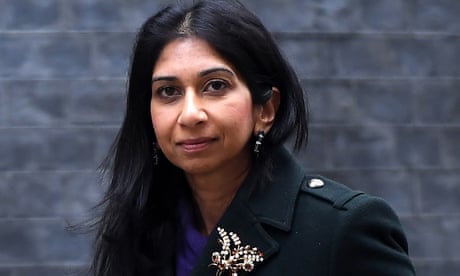
Russian minister’s claim Ukraine war ‘launched against us’ met with laughter
Sergei Lavrov says Moscow ‘trying to stop’ war in remarks at India’s Raisina Dialogue conference
Comments by Russia’s foreign minister, Sergei Lavrov, were met with laughter at an international conference in India, when he said that the Ukraine war had been “launched against” his home country.
Speaking at the Raisina Dialogue, a politics and economics event in Delhi, Lavrov also claimed that Russia was trying to stop the war.
Continue reading...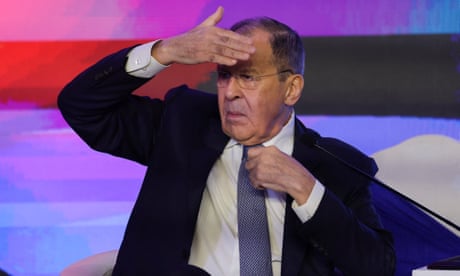
Russia accuses west at G20 of blackmail and claims it has China’s support
Stormy meeting in Delhi breaks up without joint statement as west and Moscow spar over Ukraine
Russia has accused the west of blackmail and threats and claimed it had China’s support for its position at a stormy meeting of G20 foreign ministers in India, dominated by the war in Ukraine.
The event broke up with no joint communique, only a summary of the meeting prepared by the host, India, the group’s current chair.
Continue reading...Pakistan crackdown on Afghan refugees leaves ‘four dead’ and thousands in cells
Asylum seekers in Karachi tell of terror of being sent back to the Taliban and despair at being shackled and held in Pakistani jails
Refugees are reportedly dying in Pakistani prisons, and children are being arrested and tied together with ropes, as a wave of detentions and deportations spreads fearamong the hundreds of thousands of Afghans who have crossed the border since the Taliban took power.
According to lawyers representing Afghans in detention, at least four people have died in custody, and thousands more, including children, are being held in prisons as Pakistan hardens its stance against Afghan citizens.
Continue reading...
Foreign Office scaling back support for UK Sikh activist held in India, Keir Starmer says
Sunak’s government has refused to echo assertion that Jagtar Singh Johal is being arbitrarily detained
Rishi Sunak and the Foreign Office appear to be scaling back the UK’s support for Jagtar Singh Johal, the British Sikh activist held in an Indian jail for five years, his family and Keir Starmer have said.
Sunak’s government has refused invitations to echo Boris Johnson’s assertion that the Indian government has arbitrarily detained Johal, a term seen as significant because it means the UK does not recognise there is a proper legal basis to hold him.
Continue reading...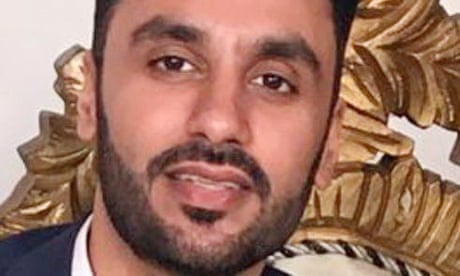
Pakistan’s fresh £580m loan from China intensifies debt burden fears
Loan is on top of £25bn that cash-strapped Islamabad already owes Beijing and Chinese commercial banks
China has agreed to loan Pakistan $700m (£580m) to help it weather its worst economic crisis in a generation, in a development that will intensify concern among western countries about cash-strapped Islamabad’s debt burden to Beijing.
The loan comes on top of $30bn (£25bn) that Pakistan already owes China and Chinese commercial banks. Securing the financing will help to unlock bailout cash from the International Monetary Fund (IMF).
Continue reading...Nearly twice as many voters believe Labour has UK’s best interests at heart
Poll finds 41% of people say Keir Starmer’s party better at backing national interest, compared with 23% for Rishi Sunak’s Tories
Almost twice as many voters believe Labour under Keir Starmer has the nation’s best interests at heart than say the Tories do under Rishi Sunak, according to the latest Opinium poll for the Observer.
The findings will disappoint Conservatives after a week in which Sunak managed to strike a well-received deal with the EU on the Northern Ireland protocol, an international negotiating success that enhanced his position as party leader and prime minister.
Continue reading...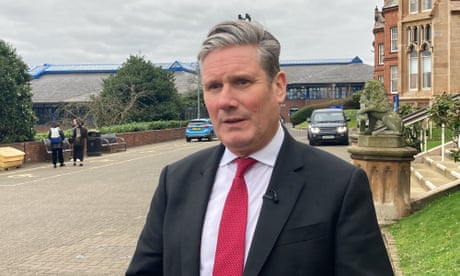
‘He’s gone full Trump’: Tories turn on Boris Johnson over Partygate
Senior MPs blast ex-PM’s ‘wicked’ claims after his backers level new accusations against Keir Starmer’s appointment of Sue Gray
Tory support for Boris Johnson is draining away tonight as party grandees likened his response to a cross-party parliamentary inquiry into whether he misled MPs over “Partygate” to the lies of former US president Donald Trump.
Several Conservative MPs in senior positions reacted with disbelief after Johnson and his dwindling band of allies questioned the work of the independent Commons privileges committee and accused it of an “outrageous level of bias”, after it said on Friday there was a significant volume of evidence suggesting that the former PM may have misled parliament.
Continue reading...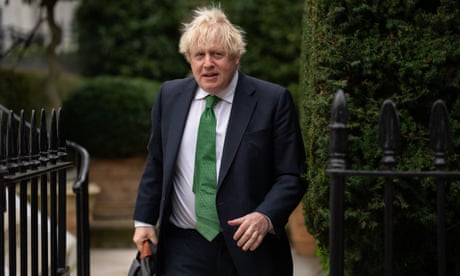
Prince Harry says some British soldiers did not ‘necessarily agree’ with war in Afghanistan
Duke of Sussex discusses his military tours in livestreamed conversation with therapist Dr Gabor Mate
The Duke of Sussex has said some British soldiers were not “necessarily” supportive of military efforts in Afghanistan.
During a livestreamed conversation with author and therapist Dr Gabor Mate, Harry discussed his military tours to Afghanistan.
Continue reading...Revealed: cabinet ministers warned of legal action over UK’s failure to tackle climate crisis
Senior civil servants have issued the warning as government is way behind on net zero pledges, according to leaked documents
Cabinet ministers have been warned by senior civil servants that they face court action because of their catastrophic failure to develop policies for tackling climate change, according to secret documents obtained by the Observer.
The leaked briefings from senior mandarins – marked “official sensitive” and dated 20 February this year – make clear the government as a whole is way behind in spelling out how it will reach its net zero targets and comply with legal duties to save the planet.
Continue reading...
Just weeks after her death, Vivienne Westwood’s rule-defying spirit lives on in Paris show
Fashion designer’s widower and collaborator Andreas Kronthaler says new collection is his tribute to her
Less than three months after the death of Vivienne Westwood, her widower and collaborator, Andreas Kronthaler, is still in the thick of overwhelming grief.
“It comes in waves,” he said, speaking backstage before the label’s show in Paris on Saturday. “This work has been kind of helpful, yes. But sometimes you pick something up, and then it hits you. But this is my personal tribute to her.”
Continue reading...
‘Sonic boom’ heard in parts of England caused by RAF jets escorting plane
Police say plane with two people onboard lost contact and had to be escorted to Stansted airport
A loud noise thought to be a sonic boom, which was heard by many people across England, was caused by RAF jets escorting a plane.
The plane had two people onboard and was flying from Iceland to Nairobi, Kenya via Southend when it lost contact and had to be escorted to Stansted airport, police said.
Continue reading...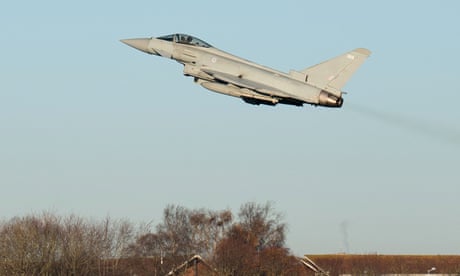
All eyes on Trump as former president to address Maga Republicans at CPAC – live
- Bolsonaro to speak and Trump to close rightwing summit
- Sign up to receive First Thing – our daily briefing by email
“If we don’t get rid of the machines, we’re going to lose our country to the world,” Lindell told crowds, referring to voting machines which he previously claimed resulted in voting errors and a ‘stolen’ election.
CEO of MyPillow Mike Lindell is now due to address CPAC. Stay tuned as we bring you the latest updates.
Continue reading...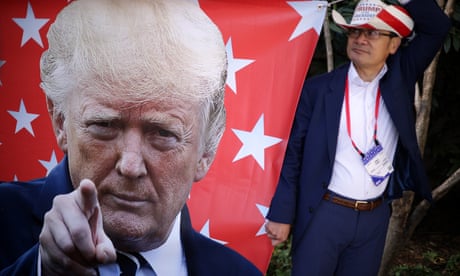
Sherrod Brown in tough election fight as Ohio crash tests Democrats’ chances
Leftwing senator has bucked trend of statewide Democratic losses but derailment in East Palestine set to test re-election hopes
US Senator Sherrod Brown has survived a decade of statewide Democratic losses in Ohio by building a reputation as the rare person in his party who can still connect with the white working-class voters who have increasingly shifted to Republicans.
But as he heads into what could be a tough re-election campaign, Brown is facing a critical test in the aftermath of the train derailment in the eastern Ohio village of East Palestine.
Continue reading...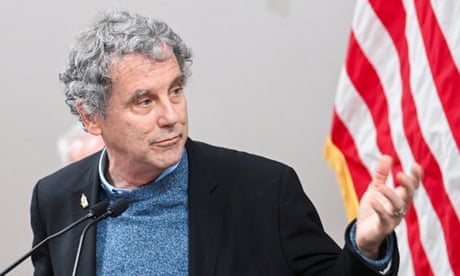
US Capitol rioter pleads guilty to stealing badge from beaten officer
Thomas Sibick pleads guilty to assault and theft charges for role in attack on the Washington DC police officer Michael Fanone
A New York man has pleaded guilty to stealing a badge and radio from a police officer who was brutally beaten as rioters pulled him into the mob that attacked the US Capitol in Washington over two years ago, court record show.
Thomas Sibick pleaded guilty on Friday to assault and theft charges for his role in the attack on the District of Columbia’s Metropolitan police department officer Michael Fanone during the January 6, 2021, insurrection when extremist supporters of then-president Donald Trump tried, unsuccessfully, to force Congress not to certify Joe Biden’s 2020 presidential victory over him.
Continue reading...
Weather tracker: back-to-back winter storms in California
More than a dozen counties declare state of emergency after heavy snowfalls, avalanches and freezing conditions
Back-to-back winter storms in California this week have brought strong winds and blizzard, and freeze warnings, causing a state of emergency to be declared across more than a dozen counties.
Palisades Tahoe ski resort in the Sierra Nevada mountain range received 3.6 metres (12 feet) of snow over the week, with 66 centimetres falling in a single day on Tuesday. This brings its cumulative total to 12.8 metres for this season, making it the snowiest since 1970.
Continue reading...
Architect Rafael Viñoly, designer of Walkie Talkie building, dies aged 78
Uruguayan-born Viñoly’s sometimes controversial work included more than 600 structures around world
Rafael Viñoly, the Uruguayan-born and New York-based architect known for designing landmark buildings around the world, has died aged 78.
Viñoly’s death on Thursday was announced by his son, Roman, on the website of the family firm, Rafael Viñoly Architects.
Continue reading...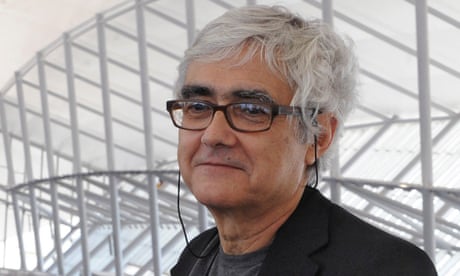
Investigation finds fatal drugging of two men in New York City to be homicide
Julio Ramirez, 25, and John Umberger, 33, were drugged and robbed while leaving gay bars last year
Two men who were fatally drugged in New York City while leaving gay bars last year and whose bank accounts had been drained were both homicide victims, according to the local chief medical examiner’s office.
The medical examiner said Friday that the deaths of social worker Julio Ramirez, 25, and political consultant John Umberger, 33, were caused by a “drug-facilitated theft”, NBC News reported.
Continue reading...
US Army Secretary Says US Is Preparing To Win A War Against China Over Taiwan
U.S. Secretary of the Army Christine Wormuth
VOA: US Army Secretary Lays Out Strategy for War with China
Washington — The Biden administration official with direct responsibility for the U.S. Army laid out in surprising detail this week a multi-pronged strategy for deterring, and if necessary, prevailing in any future war with China.
“I personally am not of the view that an amphibious invasion of Taiwan is imminent,” U.S. Secretary of the Army Christine Wormuth told an audience at the American Enterprise Institute (AEI) on Monday. “But we obviously have to prepare, to be prepared to fight and win that war.”
Elements of the plan include placing more troops in Asia and arming them with upgraded equipment, including ship-to-shore vessels and hypersonic weapons, much of which will be pre-positioned in the region.
Read more ....
US Army Secretary Says US Is Preparing To Win A War Against China Over Taiwan
US Army Secretary Says US Preparing to Win a War With China Over Taiwan -- Antiwar.com
China Will Attack U.S. Soil if Tensions Boil Over: Army Secretary -- Newsweek
The time is now to prepare for China conflict, Army leaders say -- Defense News
US Army Official Unveils Key Strategies to Win Potential War With China -- Defense Post
Russia Has A 10 to 1 Advantage Over Ukraine In Artillery
Ukrainian servicemen of the 80th Independent Air Assault Brigade fire a Howitzer D-30 artillery weapon towards Russian troops near the frontline town of Bakhmut, Donetsk region, Ukraine, February 24. REUTERS/Marko Djurica
El Pais: Ukraine outgunned 10 to 1 in massive artillery battle with Russia
Kyiv urgently requires ammunition as the Kremlin seeks a breakthrough on the eastern front, where Moscow is sending waves of infantry to deplete the defenders’ stocks of heavy shells
The Ukraine war has become a ferocious battle dominated by artillery and Ukrainian forces are operating at a huge disadvantage: Russia has numerical superiority of 10 heavy guns to every one at the disposal of Kyiv. Furthermore, Ukraine is running low on ammunition and requires urgent supplies of shells, Volodymyr Zelenskiy’s government has warned.
On the Luhansk front, at one of the Ukrainian army’s advanced positions in the area around the occupied city of Kreminna where the fighting is particularly intense, an artillery brigade is busy tuning a TRF1 howitzer cannon installed amid their sodden trenches. They received the French 155mm gun a few months ago and it is proving key to repelling Russian troops. But as the war enters its second year, Kyiv is in desperate need of fresh materiel. “We need more; we need all the ammunition they can provide. And we need it now,” says Sergey, the brigade commander, anchored next to the cannon in the mud.
Read more ....
WNU editor: My father commanded an artillery unit in the Second World War. He always credited Soviet artillery as the reason why Germany was defeated on the Eastern front. And the stats back my father. In the last two years of that war, artillery strikes accounted for 70% of all combat casualties. I suspect the same thing is happening right now in the Russia - Ukraine war.
Pentagon Orders An Engine Vibration Fix For The Entire F-35 Fleet Worldwide
A Pratt & Whitney F135 engine undergoes ground testing at Arnold Air Force Base in Tennessee. (Rick Goodfriend/U.S. Air Force)
Defense News: Pentagon orders engine vibration fix for entire F-35 fleet worldwide
WASHINGTON — All F-35 fighter jets should be retrofitted within 90 days with a fix intended to solve a potential engine vibration problem, the F-35 Joint Program Office said Thursday.
The JPO issued an order Wednesday evening recommending the fleetwide retrofit — globally, not just American aircraft — over the next three months, as well as immediately putting it in place for a “small number” of fighters that have been grounded since December.
Read more ....
Update #1: US military orders fleet-wide F-35 retrofit to address F135 engine issue (Flight Global)
Update #2: JPO directive orders F-35 retrofit to return grounded jets to flight (Breaking Defense)
WNU Editor: The Pentagon wants these fighter jets flying ASAP.
Russian President Putin Signs Decree For Defense Firms If Martial Law Is Declared
© Pavel Bednyakov/POOL/TASS
Bloomberg: Putin Orders New Rules for Defense Firms in Case of Martial Law
Russian President Vladimir Putin signed a decree Friday laying out new rules for tightening control of companies that fail to fulfill defense contracts in the event martial law is imposed, the latest step in the Kremlin’s preparations for militarizing the economy as its invasion of Ukraine stretches into a second year.
Under the decree, the state would get the power to take over firms that fail to meet their obligations under military contracts during the period of martial law, suspending the rights of owners and shareholders.
A government working group is to be set up on the operations of arms companies under martial law, according to the order, the text of which was published Friday.
Read more ....
Update: Putin amends law to ensure state defence orders are properly met (Reuters)
WNU Editor: It is a war economy right now in Russia. This decree only reinforces it.
US Air Force Breaks Derelict Ship In Half With A Single 2,000 Pound 'Quicksink' Bomb Dropped By A F-15E Strike Eagle During An Exercise
* The bomb, a JDAM, tested in the video is called the Quicksink because of the rate at which it sinks ships
* The JDAM is a relatively inexpensive way to convert unguided bombs into all-weather precision-guided munitions
* An F-15E Strike Eagle fighter launched the modified bomb, successfully striking the target by detonating a GPS-navigated bomb underneath the vessel
Recently released footage shows the decimation of a cargo ship by a 2,000 pound Joint Direct Attack Munition dropped by the Air Force from an F-15E Strike Eagle.
In the roughly one-minute video taken last April, an old, derelict cargo ship - the Courageous - is seen floating in the Gulf of Mexico.
Moments later a JDAM approaches from above and the Courageous is literally lifted out of the water and split in half, as waves begin to crash on the decks.
Read more ....
Update: Watch the Air Force sink a ship very quickly (Popular Science)
WNU Editor: That cargo ship did not have a chance.
WNU Editor: A lot of updates on the Russia - Ukraine war from the Military Summary channel. Alexander Mercouris gives his update on the war below.
James Rikards, Daily Reckoning: One of the Biggest Propaganda Campaigns Ever
It’s extremely difficult to find the truth about the war in Ukraine.
The first reason for this is because… it’s a war. Wars are always difficult to gauge in real-time. The phrase “fog of war” was invented to convey the uncertainty and imprecision about the progress of any particular war.
Still, there’s another reason the war in Ukraine is confusing for so many.
It’s because the Ukrainian propaganda effort is one of the most astonishingly effective concoctions of lies ever seen.
From the “Ghost of Kyiv” fighter ace to the “Heroes of Snake Island” to wildly exaggerated claims of Russian casualties to the suppression of any news that reflects badly on Ukraine, the Ukrainian propaganda machine has been firing on all cylinders.
This might be expected given that President Zelenskyy is a former actor and comedian. He’s used to the media stage and making up scenes for the audience. Zelenskyy is backed up by a small army of media advisers and amplified by sympathizers including President Biden, U.K. Prime Minister Rishi Sunak and outlets like The New York Times.
Read more ....
WNU Editor: WNU has been covering wars and conflicts for the past 16 years, but the Russia - Ukraine war has been unique. What makes it unique is that unlike past conflicts where the coverage mostly came from the Western press, in this war there is an incredible amount of news and coverage from both sides pushing a certain message, with non-US social media playing a major role.
To say that it has been overwhelming is an understatement, and I only wish there were more hours in the day to sort out the lies and to post my analysis.
As for James Rikards' analysis. He is correct that both sides are pursuing a massive propaganda campaign, but the Ukrainian propaganda effort has been one for the ages. And it has been incredibly effective so far.
Will this Ukrainian and Western media campaign continue to be successful? I do not know. But if today's reports that the Ukraine front lines in and around Bakhmut are collapsing, and that Ukrainian forces are retreating, it is going to be very hard for Kyiv and certain Western outlets to maintain the current narrative that I am hearing/watching/reading/and posting everyday.
© Pavel Byrkin/Russian Presidential Press and Information Office/TASS
Peter Frankopan, Spectator: Is Putin winning? The world order is changing in his favour
‘This is not about Ukraine at all, but the world order,’ said Sergei Lavrov, Russia’s foreign minister, a month after the invasion. ‘The unipolar world is irretrievably receding into the past … A multi-polar world is being born.’ The US is no longer the world’s policeman, in other words – a message that resonates in countries that have long been suspicious of American power. The West’s core coalition may remain solid, but it has failed to win over many of the countries that refused to pick sides. Moscow’s diplomatic mission to build ties and hone a narrative over the past decade has paid dividends.
Look at Africa. In March last year, 25 African states out of 54 abstained or didn’t vote in a UN motion condemning the invasion, despite huge pressure from western powers. Their refusal to side clearly with Ukraine was testament to Russia’s ongoing diplomatic efforts in the developing world.
Read more ....
WNU Editor: The Spectator is as pro-Ukraine as you can get. But this Spectator post is as bleak as you can get on Ukraine.
In the meantime some in the West continue to be optimistic .... Putin Can’t Win: New Western Insights Show Russia Won’t Claim Victory in Ukraine (US News and World Report).
Moscow Fears The U.S. May Launch A Nuclear First Strike Against Russia
Russian Yars Nuclear Missile
Reuters: Russia journal: Moscow mulls possible use of nuclear arms to fend off US attack
A Russian defence ministry journal says Moscow is developing a new type of military strategy using nuclear weapons to protect against possible U.S. aggression, RIA news agency reported on Thursday.
The article is the latest in a series of combative remarks by Russian politicians and commentators after the invasion of Ukraine on Feb. 24 last year, suggesting Moscow would, if necessary, be prepared to deploy its vast nuclear arsenal.
RIA said the article, published in the Voennaya Mysl (Military Thought) magazine, concluded Washington was worried it might be losing dominance over the world and had therefore "apparently" prepared plans to strike Russia to neutralise it.
Read more ....
WNU Editor: In the past few months I have noticed this change among many of my Russian family members and friends on the possibility that the US may launch a nuclear first strike against Russia if the situation on the ground in Ukraine worsens for Kyiv. This Russian defence ministry journal is voicing what many fear Washington will do next.
Update: I take Russian nuclear threats seriously. I completely disagree with this point of view .... Russian Nuclear Threats Are Empty, Part of ‘Information Operation:’ ISW (Newsweek).
Moscow Fears The U.S. May Launch A Nuclear First Strike Against Russia
Moscow Should Prepare For Probable US Nuclear Aggression: Reports Russian Military Journal -- SOFREP
Russia Unveils New Nuclear Strategy -- Newsweek
Ukraine War: Russia Ready To Use ‘NUKES’ To Deter The US Losing Global Dominance – Military Journal -- EurAsian Times
Russian military says it is developing new type of operation against US "aggression" -- Ukrayinska Pravda
Report Says China Leading The World In Race For Critical Technologies
* China leads the US in the research of 37 out of 44 key technologies tracked by an Australian think tank.
* These critical and emerging technologies span a range of sectors including defense, space, and energy.
* China's research lead in these sectors could have implications for democratic nations.
China has a "stunning lead" ahead of the US in high-impact research across critical and emerging technologies, according to Canberra-based independent think tank Australian Strategic Policy Institute, or ASPI.
The world's second-largest economy is leading the US in researching 37 out of 44 critical and emerging technologies across the defense, space, energy, and biotechnology sectors — including research of advanced aircraft engines, drones, and electric batteries — the ASPI said in its Thursday report.
The US State Department partly funded the study.
Read more ....
WNU Editor: The report is here .... ASPI’s Critical Technology Tracker - The global race for future power (Australian Strategic Policy Institute)
Report Says China Leading The World In Race For Critical Technologies
China on track to dominate development of critical future technologies, ASPI report says -- ABC News Australia
China leading world in critical technology a ‘wakeup call’ for democratic nations -- SKY News
China leading US in technology race in all but a few fields, thinktank finds -- The Guardian
China denting US tech dominance, leads in 37 of 44 fields, claims report -- Interesting Engineering
China beating West in race for critical technologies, report says -- Al Jazeera
US To Announce Another New Military Aid Package For Ukraine On Friday
Air Force airmen assigned to the 721st Aerial Port Squadron load pallets of ammunition that will be transferred to a C-130 Hercules at Ramstein Air Base, Germany, Aug. 7, 2022. The ammunition is being delivered to Ukrainian forces. Photo By: Air Force Capt. Emma Quirk
Reuters: US to announce new military aid package for Ukraine on Friday
WASHINGTON (Reuters) -The United States will announce a new military aid package for Ukraine on Friday, worth roughly $400 million and comprised mainly of ammunition, two officials and a person familiar with the package said.
Aid for Ukraine is expected to be a major topic when President Joe Biden and German Chancellor Olaf Scholz meet at the White House on Friday.
The package, the sources said on Thursday, is expected to contain more Guided Multiple Launch Rockets (GMLRS) for HIMARS launchers, ammunition for the Bradley Fighting Vehicles, as well as armored vehicle launched bridges.
Read more ....
Update #1: US to send more ammo, folding armored bridges to Ukraine (AP)
Update #2: US to Unveil New Ammunition Aid to Ukraine Friday (AFP)
German Chancellor Scholz To Meet President Biden At The White House
* Two men will sit down in Oval Office for private meeting Friday
* Will discuss their recent meetings with Zelensky
* Zelensky wants more Western weapons amid worries China will arm Russia
President Joe Biden and German Chancellor Olaf Scholz will discuss the war in Ukraine during a closed-door meeting at the White House on Friday that comes as China considers arming Russia and Republicans push back on U.S. assistance to the embattled nation.
The two leaders also will discuss the meetings each man had with Ukrainian President Volodymyr Zelensky - Biden when he traveled to Kyiv two weeks ago and Scholz when Zelensky traveled to Paris in early February - and his requests for more military aid.
Read more ....
WNU Editor: Will German Chancellor Scholz ask President Biden directly if he ordered the destruction of the Nord Stream pipelines? I doubt it. the meeting will focus on China and supplying weapons to Ukraine.
German Chancellor Scholz To Meet President Biden At The White House
German chancellor goes to US feeling confident -- DW
Biden, Scholz to huddle on Ukraine war at White House -- AP
Biden welcomes German Chancellor to White House for talks on Ukraine -- UPI
Biden, Scholz to map out next steps for Ukraine -- AFP
Ukraine, China on agenda for Biden meeting with German chancellor -- USA Today
Joe Biden to meet Olaf Scholz in effort to keep Ukraine strategies aligned -- The Guardian
Biden, Germany's Scholz to weigh Ukraine aid in White House meeting -- Axios
Belarus Jails Nobel Peace Prize Laureate Ales Bialiatski For Ten Years
Reuters: Nobel winner Bialiatski jailed in Belarus for a decade, sparking outcry.
TALLINN, Estonia (AP) — A court on Friday sentenced Belarus’ top human rights advocate and one of the winners of the 2022 Nobel Peace Prize to 10 years in prison, the latest move in a yearslong crackdown on dissent that has engulfed the ex-Soviet nation since 2020.
The harsh punishment of Ales Bialiatski and three of his colleagues was delivered in response to massive protests over a 2020 election that gave authoritarian President Alexander Lukashenko a new term in office.
Read more ....
WNU Editor: You know we are living in dark times when a 60 year old Nobel Peace Laureate has spent the past year and nine months in jail, and has just been sentenced to spend another ten years.
Belarus Jails Nobel Peace Prize Laureate Ales Bialiatski For Ten Years
Ales Bialiatski: Nobel Prize-winning activist sentenced to 10 years in jail -- BBC
Nobel Peace Prize winner Ales Bialiatski sentenced to 10 years in prison in Belarus -- CBC/AP
Belarusian Nobel Laureate Byalyatski Sentenced To 10 Years In Prison -- RFE
Nobel laureate Ales Bialiatski sentenced to 10 years in prison by Belarusian court -- CNN
With Russian Forces Advancing, Kyiv Orders The Partial Evacuation Of Kupiansk, A City That Was Retakened Last Year
BBC: Ukraine war: Kyiv orders partial evacuation of liberated city
Ukraine has ordered some residents to leave Kupiansk, as Russia seeks to re-take the city it left last year.
Kharkiv's regional authorities said families with children and people "with limited mobility" must leave due to "constant" shelling by Russian forces.
Russia seized the north-eastern city early in the full-scale invasion, with Ukraine recapturing it last September.
Meanwhile, Russian mercenaries say they have "practically encircled" the key city of Bakhmut in eastern Ukraine.
Read more ....
WNU Editor: Kupiansk is a critical rail hub. Russian forces will need to retake this city to deny the Ukrainian army the logistical support that is necessary for Kyiv to supply their forces in the region and northern Donbas. After the fall of Bakhmut, this may become the new battle line.
With Russian Forces Advancing, Kyiv Orders The Partial Evacuation Of Kupiansk
Kupiansk: Ukraine orders people to leave city liberated last year -- Al Jazeera
Occupied, liberated … occupied again? Ukrainian city fears another takeover -- The Guardian
The Town Of Kupiansk, Kharkiv Province On Ukraine's Northeastern Front Could Decide New Battle Lines -- Republic World/AP
Russia's Wagner Leader Says Ukraine's Bakhmut Is Practically Surrounded
Yevgeny Prigozhin, founder of Russia's Wagner mercenary force, speaks in Paraskoviivka © Thomson Reuters
Reuters: Russian mercenary chief says Ukraine's Bakhmut is practically surrounded
(Reuters) -Yevgeny Prigozhin, founder of Russia's Wagner mercenary force, said in a video published on Friday that the Ukrainian city of Bakhmut was "practically surrounded" by his forces and that Kyiv's forces had only one road left out.
Prigozhin's men have spearheaded the assault in eastern Ukraine for months.
Moscow regards Bakhmut, which it calls by its Soviet-era name of Artyomovsk, as a useful stepping stone to seize bigger cities like Kramatorsk and Sloviansk.
Prigozhin, wearing a military uniform in the video, called on Ukrainian President Volodymr Zelenskiy to withdraw his forces from the small city.
Read more ....
WNU Editor: The military experts are trust tell me that Russia has now attained fire-control over all roads leading in and out of Bakhmut. I do not know how many Ukrainian soldiers are left in Bakhmut, but it looks like they are going to experience the same fate that Ukrainian soldiers faced in Mariupol. A siege that will go on for the next month or two before there is a mass surrender.
Russia's Wagner Leader Says Ukraine's Bakhmut Is Practically Surrounded
Ukraine updates: Russia's forces surround Bakhmut -- DW
Wagner Boss Trots Out Terrified Ukrainians to Deliver Grim Message -- Daily Beast
Ukraine's Bakhmut 'Practically Surrounded,' Wagner Leader Prigozhin Says -- Moscow Times
Ukraine war: Bakhmut 'practically surrounded', claims Russian paramilitary Wagner group -- Euronews
Wagner chief calls on Zelenskiy to abandon ‘encircled’ Bakhmut -- The Guardian
Russians pound access routes to Ukraine's besieged Bakhmut -- Reuters
A Majority Of Americans Want The U.S. To Continue To Take A Major Role In World Affairs
Gallop: Fewer Americans Want U.S. Taking Major Role in World Affairs
* 65% want leading or major role for U.S.
* Republicans much less likely to favor prominent role than in past
* Most Americans dissatisfied with U.S. position in world
WASHINGTON, D.C. -- Sixty-five percent of Americans prefer the U.S. to take the leading (20%) or a major role (45%) in world affairs. This is down from 69% in 2019 and 72% as recently as 2017. The current figure is one percentage point below the prior low from 2011. In almost all years since Gallup first asked the question in 2001, more than seven in 10 Americans have favored a leading or major role for the U.S., including a high of 79% in February 2003.
Read more ....
WNU Editor: The world is a different place today, and many are not sympathetic to Washington. As the world breaks up into multi-polar blocs, there is going to be push-back against the U.S. and its economic/political/military/and social policies.
My hope is that the foreign policy experts in Washington are smart enough to realize that, and be able to maneuver US foreign policy to safeguard US interests, while respecting what other countries want. This could be a new age for the US on the world stage, or a mess of disputes and conflicts that will only drain the US in both blood and treasure.
Will Undersea Cables Be The Next Target In The Current Hybrid War Between The West And Russia?
An undersea internet cable lurking in the depths. Foreign policy analysts argue that these conduits, the effective backbone of the global internet, are in danger of being sabotaged by hostile powers. (Photo by JesperG/Shutterstock)
Tech Monitor: Could undersea cables be the next casualty of hybrid warfare?
The UK, Italy and France are all investing in new ships and infrastructure to protect the internet from Russian aggression. Critics argue they’re overreacting.
The Akademik Boris Petrov is officially listed as a research vessel. About 75 metres long and moored, at the time of writing, in the Russian enclave of Kaliningrad, the ship’s official purpose is to survey the ocean depths. Others believe its role is more nefarious. Labelled a ‘spy ship’ by several UK tabloids, the vessel’s brilliant white silhouette has been variously described as skulking away from the Shetland Islands just after its undersea internet cable connection to the rest of the world was severed, and being forced out of the Netherlands’ territorial waters by that country’s coastguard under suspicion of mapping the underwater infrastructure syphoning natural gas and internet traffic in and out of Western Europe.
To clarify, the Akademik Boris Petrov has not been officially labelled as a Russian spy vessel by any government, and neither has it been conclusively linked to acts of sabotage or espionage as they pertain to undersea internet cables. But Western capitals are worried.
Read more ....
WNU Editor: The deliberate destruction of the Nord Stream pipelines last year has opened the door that undersea infrastructures are now fair game. To me it is a given that it is only a matter of time before the West's undersea internet infrastructure is targeted as the war in Ukraine escalates.
Russia To Mothball Nord Stream Gas Pipelines
Nord Stream 2
Financial Post/Reuters: Russia set to seal up damaged Nord Stream gas pipelines: reports
Nord Stream 1 and 2 pipes ruptured in unexplained blasts last year
MOSCOW/FRANKFURT — Russia’s ruptured undersea Nord Stream gas pipelines are set to be sealed up and mothballed as there are no immediate plans to repair or reactivate them, sources familiar with the plans have told Reuters.
Three of the pipes were ruptured by unexplained blasts in September, and one of the Nord Stream 2 pipes remains intact. But soaring tensions between Moscow and the West over Russia’s invasion of Ukraine had by then already brought Nord Stream 1 to a standstill and prevented its twin, criticized by Washington and Kyiv for increasing Germany’s dependence on Russia, ever coming online.
Read more ....
WNU Editor: It is now official. Russia is shifting away from Europe to sell its energy resources .... Lavrov says Russia will ‘no longer rely’ on West for energy trade as Moscow pivots to India and China (Independent). More here .... Lavrov says Russia will no longer rely on West in energy policy (TASS).
Public Anger Rises As Iranian Currency Hits New Lows
A currency dealer poses for a photo with a U.S dollar bill and the amount being given when converting it into Iranian rials in an exchange shop in Tehran in December 2022.
Reuters: Iran rial plunges to new lows amid unrest, international isolation
Iran's currency fell to a record low against the U.S. dollar on the unofficial market on Sunday, amid the country's increasing isolation over its disputed nuclear programme, human rights violations and the supply of drones to Russia.
The U.S. dollar was fetching as much as 601,500 rials on Iran's unofficial market on Sunday, compared with 575,000 on the previous day and 540,000 on Friday, according to foreign exchange site Bonbast.com.
Iranian authorities have blamed the currency's fall on "the enemies' plot" to destabilise the Islamic Republic after months of unrest sparked by the death in custody of a young woman on Sept. 16.
The rial has lost nearly half of its value since the start of nationwide protests, the boldest challenge to theocratic rule since the 1979 Islamic Revolution.
Read more ....
Update #1: Iran’s currency hits new low amid anti-government protests (AP)
Update #2: Free-falling rial leaves Iranians worried about financial future (Al Jazeera)
WNU Editor: The Iranian government is in a Catch-22 situation. The government provides subsidies and support programs that are not sustainable, but cutting these programs will only fuel more protests. Here is an easy prediction. Currency depreciation and high inflation are not coming down anytime soon.
Pro-Ukraine Display In The Latvian Capital Went Off Script
In #Talin #Estonia special guards were in place to remove flowers 🌹 placed on the #Russian tank but ppl still came and tried to do so! pic.twitter.com/r8uXbDvgDP
— Arthur Morgan (@ArthurM40330824) February 26, 2023
RT: Pro-Kiev stunt in Baltics goes awry (VIDEO)
The displays of destroyed Russian tanks somewhat backfired on those behind the project
Actions in support of Kiev in Estonia, Latvia, and Lithuania went off script over the weekend as locals started bringing flowers to destroyed Russian tanks that had been put on display in the three nations’ capitals to demonstrate solidarity with Ukraine.
A video released by RT's video agency Ruptly shows small bouquets of flowers lying on the ground near a burnt-out Russian tank in the Latvian capital of Riga. The destroyed equipment was put on display at one of the central city squares to mark the anniversary of the ongoing conflict between Moscow and Kiev, which started in late February 2022.
Read more ....
WNU Editor: Almost a third of the population in Latvia are of Russian decent. Not all are onboard with the Latvian government's stand on the Russia - Ukraine war.
Picture Of The Day
A building is seen on fire in Hong Kong, China March 3, 2023. A fire tore through the upper floors of an under-construction skyscraper in the Tsim Sha Tsui area of Hong Kong in the early hours of Friday. REUTERS/Tyrone Siu
WNU Editor: The above picture is from this photo-gallery .... Fire breaks out in Hong Kong skyscraper under construction (Reuters).


























